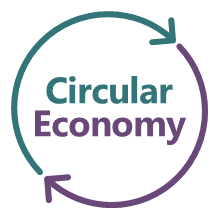A circular economy necessarily requires greater transparency vis-à-vis the consumer. To this end, the Anti-Wastage & Circular Economy Law (the AGEC law) imposes on companies numerous new obligations intended to better inform consumers notably about the environmental characteristics of products, their recyclability as well as their repairability.
Some of the measures described below can only be implemented after the adoption of implementing measures, which have not yet all been adopted. To find out more, please refer to our article “Implementation of obligations to inform consumers under the AGEC Law – main regulatory legislation”.
Information on environmental qualities and characteristics
Compulsory information on the environmental qualities and characteristics of waste-generating products
Professionals must inform consumers about the environmental qualities and characteristics of waste-generating products, in particular by marking, labelling or display. This information must be visible or accessible electronically by the consumer at the time of purchase.
These include: the incorporation of recycled material, the use of renewable resources, the durability, compostability, repairability, possibilities for reuse, recyclability and the presence of dangerous substances, precious metals or rare earths.
In this context, consumers must also be informed of any adjustment in the eco-contribution paid by the producer (premium or penalty) according to environmental performance criteria.
Compulsory warnings ("do not litter") or prohibited ones ("biodegradable" or "environmentally friendly") on products and packaging, particularly those made of plastic, are also provided for.
For any product presented as "recycled", the percentage of recycled material actually incorporated must be indicated.
These obligations have been specified by decree. For some operators, they have been applicable since 1 January 2023, while for others they will apply from 1 January 2024 or 1 January 2025.
Please note: Law no. 2021-1104 of 22 August 2021 on combating climate change and building resilience to its effects, known as the "Climate and Resilience Law", also regulates advertising.
See, for example, the prohibition in principle of carbon neutrality claims:
It is prohibited to state in an advertisement that a product or service is carbon neutral or to use any wording of equivalent meaning or scope, unless the advertiser makes the following readily available to the public:
- A greenhouse gas (GHG) emissions report integrating the direct and indirect emissions of the product or service;
- The process by which the GHG emissions of the product or service are firstly avoided, then reduced and lastly offset. The GHG emissions reduction trajectory is described using quantified annual progress targets;
- The methods for offsetting residual GHG emissions complying with minimum standards defined by decree.
Information on the environmental impact of products and services
Display of the environmental impact of goods and services
An optional environmental and social labelling system, designed to provide consumers with information on a product's environmental characteristics, was initially provided for under the AGEC Law.
Under the Climate and Resilience Law, this system was replaced by a mandatory display of the environmental impact and specific impact in terms of GHG emissions of certain products and services over their entire life cycle, by means of marking, labelling or any other suitable process that is visible or accessible at the time of purchase.
This may take the form of a grade (A, B, C, D or E) marked on the products or services.
The list of products and services concerned will be specified by decree (clothing, food, furniture, hotels and electronics), after a trial period of up to 5 years.
Please note: The Climate and Resilience Law also makes it mandatory to provide summary information on the environmental impact of goods and services, considered over their entire life cycle (visible and easily understandable) in advertising, if this information is available, for the following products:
- goods and services for which environmental labelling has been made compulsory (see above);
- products covered by a mandatory energy label (washing machines, cooker hoods, etc.): in this case, the summary information is the energy efficiency class;
- motor vehicles covered by a compulsory label: in this case, the summary information is the carbon dioxide emissions class.
Specific information obligations
Since 1 January 2022, specific information are also in force with regard to endocrine disrupters and greenhouse gases linked to Internet use.
Information on the repairability and durability of electrical and electronic equipment (EEE)
On 1 January 2021, it became mandatory for producers and distributors of EEEs, to communicate free of charge on the repairability rating of such EEEs, and on the parameters that enabled such rating to be established. This mandatory information is to be made available to the sellers of such products, as well as to any person who requests it.
The index is presented in the form of a score out of 10 and a colour code indicating the level of reparability of the product, based in particular on the length of time technical documentation is available, the ease with which the product can be dismantled and the tools required to do so, the length of time spare parts are available and their price.
Sellers of EEE, including online sellers and platforms, must pass this information on to the consumer at the time of purchase, free of charge. It must also be made available online. The index is affixed to the equipment or in its immediate vicinity for in-store sales, or in the presentation of the equipment near its price in the case of online sales.
From 1 January 2024, a product durability rating (including in particular the reliability and robustness of the product) will supplement or replace the repairability rating.
The details of the modalities for establishing these ratings, as well as the list of products and equipment concerned, was specified by a decree and two series of orders from 29 December 2020 and 22 April 2022.
Reinforcement of consumer information on sorting rules via the Triman and the Info-Tri
On 1 January 2022, the affixing of the Triman logo was extended to all household products put on the market subject to the principle of extended producer responsibility, excluding packaging for glass beverages.
This signage must be accompanied by information specifying guidelines for sorting the waste generated by the product (known as "Info-Tri"). These guidelines must be detailed item by item if the resulting waste needs to be sorted separately.
The procedures for implementing this obligation were set out in a decree dated 29 June 2021.
The information must appear primarily on the product or its packaging or, failing this, in the other documents supplied with the product, and be available online. In the case of household packaging, the decree stipulates that this information must be displayed on the packaging (except in the case of small packaging).
Please note: on 15 February 2023, the European Commission opened infringement proceedings against France for failure to ensure that labelling requirements in the country relating to waste sorting comply with the principle of the free movement of goods (Triman logo and Info-Tri information). To be continued…
In a parallel proceeding, on 21 April 2023, the French Council of State rejected the appeals on the grounds of ultra vires filed against "Triman" decree no. 2021-835 of 29 June 2021 by trade organizations, which claimed in particular that the principle of the free movement of goods had been disregarded. On this point, the Council of State ruled that the new “Triman” regulation constitutes a measure equivalent in effect to a quantitative restriction on imports, but that it is justified by the objective of protecting the environment and cannot be considered as going beyond strictly necessary constraints. This decision does not prejudge the Commission's future decision.
In addition, the eco-contribution due for waste management may be subject to a penalty in the event of the use of signage and markings which could lead to confusion regarding sorting or disposing of the waste.
Please note: the texts providing in this respect for the penalization of the use of the Green Dot in particular, after having been suspended in summary proceedings on 15 March 2021, were finally annulled by the French Council of State on 30 June 2023. This annulment was justified by the failure to notify the texts concerned, prior to their publication, to the European Commission, as must be the case for any rule of a technical nature, within the meaning of Directive (EU) 2015/1535. The Government may, however, choose to proceed with such notification. To be continued...
Reinforcement of information on the availability (or not) of spare parts
As of 1 January 2022, under the pre-contractual obligation to inform, information must be given to the reseller on the availability of spare parts essential for the use of movable goods and, if applicable, on the duration or date until which these parts are available.
For EEE and furniture items, spare parts essential to the use of the good are deemed to be unavailable unless information is provided to the professional reseller.
A mandatory minimum period of availability for spare parts is imposed for certain goods. This specific obligation currently applies to laptops (excluding tablets, etc.) and multifunction mobile phones (Decree 2021-1943 of 31 December 2021).
Additionally, the AGEC Law encourages repairers to use parts from the circular economy and even provides for a scenario in which the spare part can be manufactured by 3D printing.
Similarly, the AGEC Law imposes that information be cascaded down to the consumer on the updates necessary to maintain the conformity of goods containing digital elements. It also announces future work on "software obsolescence". It should also be noted that programmed obsolescence is sanctioned under criminal law.
Information on the "refurbished" nature of products
The AGEC Law provides a legal framework for the use of the terms "refurbished" and "refurbished product".
The conditions under which a professional may use these terms were specified by a decree dated 17 February 2022.
Reinforcement of information on the legal guarantee of conformity
As of 1 July 2021, for certain categories of goods, any "billing document" given to the consumer must mention the existence and duration of the legal guarantee of conformity (however, this is not compulsory in the case of goods purchased emotely - in which case it must appear in the confirmation of the contract provided on a durable medium). This obligation, which was clarified by a decree dated 18 May 2021, including the categories of goods concerned, should be more fully explained, as currently the issuing of an invoice for the sale of goods or the provision of services to the consumer is in principle not mandatory (only a receipt has to be drawn up in the latter case when the client asks for it and for services whose price is equal to or in exceeds EUR 25 incl. VAT).
Please note: Protection under the legal guarantee of conformity has been reinforced for new goods, as well as for second-hand goods (six-month warranty extension for goods repaired in this context, extension of the presumed existence of the lack of conformity from 6 to 12 months for second-hand goods including refurbished or remanufactured goods, etc.).
New business practice deemed to be misleading and reinforcement of sanctions
Lastly, we note the extension, by the AGEC Law of the list of business practices deemed to be misleading to the practice consisting, in an advertisement, of giving the impression that the consumer is getting a price reduction comparable to that in sales outside their legal period.
Please note: this new provision could be considered to be contrary to European Union law which establishes a restrictive list of practices deemed to be misleading in all circumstances (Directive 2005/29/EC).
The list of commercial practices deemed to be misleading was once again subsequently extended.
The Climate and Resilience Law strengthens the sanctions applicable to misleading commercial practices, particularly in the case of misleading environmental claims. Misleading commercial practices are now sanctioned by two years' imprisonment and a fine of EUR300,000 for a natural person / EUR 1.5 million for a legal entity. The fine may be increased to 10% of average annual sales, or 50% of the expenditure incurred in carrying out the advertising or practice constituting the offence. This 50% rate is now increased to 80% in the case of misleading environmental claims.
Related topic:
Anti-Wastage and Circular Economy Law
|
| Find all our analysis of the main measures of the Anti-wastage and Circular Economy Law below: |
Find more about our law firm:
Our law firm is a leading international business law firm. Its deep roots, unique positioning and highly recognised expertise enables it to deliver innovative, high value-added solutions in tax, business, corporate and labour law.











%20(3)%20(1).jpg?v=2)





Social Media cookies collect information about you sharing information from our website via social media tools, or analytics to understand your browsing between social media tools or our Social Media campaigns and our own websites. We do this to optimise the mix of channels to provide you with our content. Details concerning the tools in use are in our privacy policy.